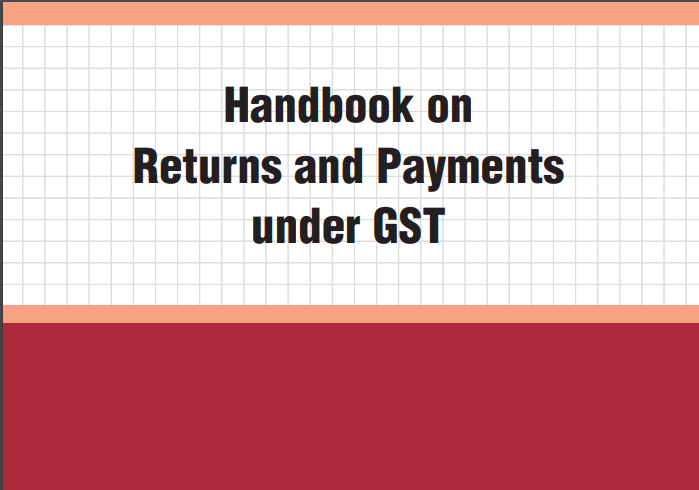Handbook on Returns and Payments under GST: ICAI
Handbook on Returns and Payments under GST
1. Introduction
‘Remember to celebrate milestones as you prepare for the road ahead.’ And yes, it would be inappropriate if we don’t recall the most illustrious date 1st July 2017 – the date on which the most fancied Goods and Services Tax legislation, the outcome of 16 years of deliberations took shape.
“Confront the dark parts of yourself, and work to banish them with illumination and forgiveness. Your willingness to wrestle with your demons will cause your angels to sing” remarked August Wilson. Continuing the saga of Central Excise, Sales tax, and Service tax, the whole concept of Goods and Services Tax is also founded on the principles of self-assessment. Needless to mention, the ‘dark parts’ being the taxpayer’s unpaid tax dues, ‘demons’ being ‘unwarranted litigation’, and angels being the taxpayer’s proper officer.
2. Significance of Self-Assessment in GST
Section 59 of the Central Goods and Services Tax Act, 2017 (hereinafter referred to as ‘The Act’) states that “every registered person shall self-assess the taxes payable under the Act”.
Self-assessment means an assessment by the registered person himself and not an assessment conducted or carried out by the Proper Officer. Every registered person would be required to assess his tax dues in accordance with the provisions of the Act and report the basis of calculation of tax dues to the tax administrators, by filing periodic tax returns.
The term ‘return’ is defined in Section 2(97) of the Act thus: – “It means any return prescribed or otherwise required to be furnished by or under this Act or the Rules made thereunder”.
Hence, furnishing the prescribed returns with true and correct particulars in accordance with the Act and the Rules made thereunder (hereinafter referred to as the ‘the Rules’) amounts to proper compliance with the provisions of self-assessment.
3. Who should furnish returns under GST
Every person who is registered under GST should furnish returns as prescribed by the Act and the Rules and at the prescribed frequency.
Provisions related to Registration are detailed under Chapter VI of the Act, and the persons liable to take registration are provided specifically under Sections 22, 24, and certain portions of Section 25 of the Act.
Related Topic:
Handbook For Tax Consultants/Taxpayers-Nov. 2020: IT Deptt.
To encapsulate, the following persons are termed as ‘registered persons’ under GST:
1. Those persons whose aggregate turnover in a financial year exceeds the threshold limit (registration is applicable once the turnover exceeds the threshold limit; however the small taxpayers can opt to get registered as composition taxpayers). This category also includes Special Economic Zone Unit (SEZ Unit) and Special Economic Zone developer (SEZ developer).
2. Irrespective of the aggregate turnover, the following persons are liable to take compulsory registration:
(i) Persons making any inter-State taxable supply of goods (except those making interState supplies of handicraft goods);
(ii) Persons who are required to pay tax under reverse charge under Section 9(3) and 9(4) of the Act;
(iii) Persons making a taxable supply of goods/ services/ both on behalf of other taxable persons, whether in the capacity of an agent or otherwise;
(iv) Persons supplying through e-commerce operator, where such e-commerce operator is liable to collect tax at source under Section 52 of the Act;
(v) E-commerce operators who are required to pay tax under Section 9(5) of the Act;
(vi) Casual taxable persons making taxable supply (except those making the supply of handicraft goods);
(vii) Non-resident taxable persons making taxable supply;
(viii) Those persons covered under Section 14 of Integrated Goods and Services Tax Act, 2017 (hereinafter referred to as ‘IGST Act’ – Those persons supplying Online Information and Database Access or Retrieval Services (OIDAR services) from a place outside India to a person in India, other than a registered person;
(ix) Input service distributor;
(x) Persons who are required to deduct tax under Section 51 of the Act;
(xi) Every e-commerce operator who is required to collect tax at source under section 52 of the Act; and
(xii) Such persons who have been issued a Unique Identity Number and claim a refund of taxes paid on their inward supplies i.e. any specialized agency of the United Nations Organisation or any Multilateral Financial Institution and Organisation notified under the United Nations (Privileges and Immunities) Act, 1947, Consulates or Embassy of Foreign Countries.
Related Topic:
9th Revised Background Material on GST Volume-I: ICAI
In addition to the above, all persons/establishments stated above who have obtained or are required to obtain registration in the same State / Union Territory or in a different State / Union Territory (i.e. distinct persons and distinct establishments as mentioned under Section 25 of the Act) are also required to obtain registration.
All the above-mentioned persons who are required to take registration under the Act are also required to file returns as per the provisions of Section 59 of the Act.
Read & Download the full Copy in pdf:
If you already have a premium membership, Sign In.
 ConsultEase Administrator
ConsultEase Administrator
Consultant
Faridabad, India
As a Consultease Administrator, I'm responsible for the smooth administration of our portal. Reach out to me in case you need help.













